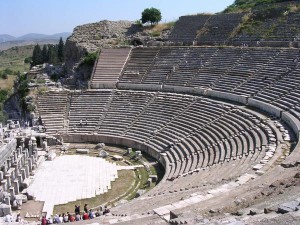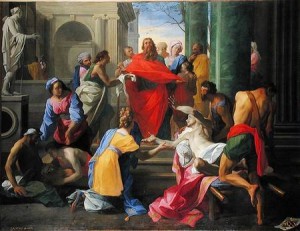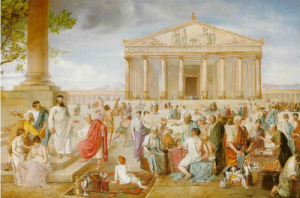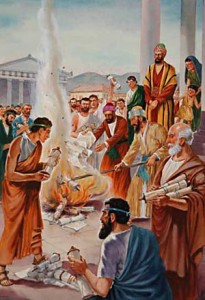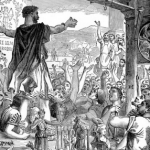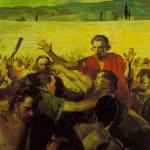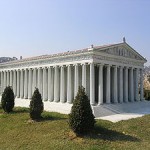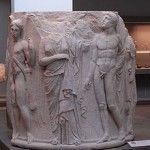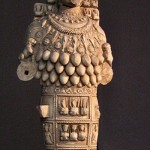Reflections on a Pauline Pilgrimage to Turkey [5]
“Put on the whole armor of God, so that you may be able to stand against the wiles of the devil. For we are not contending against flesh and blood, but against the principalities, against the powers, against the world rulers of this present darkness, against the spiritual hosts of wickedness in the heavenly places.” [Ephesians 6:11-12]
[1] The giant Theatre, Ephesus. [2] Miracles of St Paul at Ephesus, by Jean Restout 1693. [3] “Paul preaching before the Temple of Diana at Ephesus” – by Adolf Pirsch, 1885.
During our tour of the ancient city of Ephesus, we lingered quite a bit at the giant theatre which once held an audience of 24,000 people. We were told the acoustic of this ancient theatre was fantastic. Without modern day public address systems, if one spoke or sang at the base-stage, those seated at the very top row could hear. So we took out our hymn books and sang. A group of American tourists seated some 10 rows up clapped after each hymn. In that atmosphere it was easy to get carried away by enthusiasm, so we sang one hymn after another, until our guide had to come and urge us along.
Some two millennia ago, at the same giant theatre, the crowd of silversmiths were even more stirred up, but on that occasion, what they wanted was the blood of Paul.
Paul arrived Ephesus during the course of his third mission. He had come across Asia Minor from Antioch in Syria. Earlier, he had left Cenchraea, the eastern port of Corinth where he stayed for eighteen months, in the same ship with his two devoted friends and fellow tent-makers, Aquila and Priscilla. This husband and wife team had left Corinth for Ephesus apparently for more profitable work in view of the higher-end market there. No doubt, as we imagine, they could and would prepare the way for Paul’s ministry in this rich city as well.
Paul earning his own keep
Paul, as Scriptures have consistently attested, was determined to support himself and declined to rely on the generosity of his converts. Here is an aspect of St Paul’s spirit that bears repeating, as Morton has accurately noted: side by side with his intense spiritual life existed the harsh fight for material existence. Knowing that spirit helps us better understand his written texts. So, we can feel the harsh and cruel reality he had had to endure as he wrote to the Corinthians from Ephesus: “To the present hour we hunger and thirst, we are ill-clad and buffeted and homeless, and we labour, working with our own hands” [1 Cor 4:11-12]. And when he bade farewell in Miletus to the Ephesian elders whom he had sent for, he said: “You yourselves know how I lived among you all the time from the first day…. I coveted no one’s silver or gold or apparel. You yourselves know that these hands ministered to my necessities and to those who were with me….” [Acts 20:17-38]. Is there any surprise that we should hear him say, this time to the Thessalonians: “If anyone will not work, let him not eat” [2 Thess 3:10]?
Paul meeting with resistance from the Jews
So Paul worked on weekdays and put down his tools on the Sabbath eve and taught in the synagogue. The size and grandeur of the ruins of the synagogue in the ancient city of Ephesus speak volumes about the affluence of the diaspora Jews in that city. But it was always the same story repeating itself. The Jews would not listen to Paul, refused the Gospel of Christ, and contrived to close the doors of the synagogue to him. When this Jewish blockade pitched precariously towards a breach of the peace, St Paul knew that it was time to call it quits with the Jews.
Two things capture our imagination right there.
First, troubles and difficulties have a way of conspiracy about them. When they happen, as they must do, problems in life do not come in drips and drapes, but they pour down in sheets. As Paul struggled in his three-month teaching attempt at the Ephesian synagogue, news of troubles in the young faith community he planted in Corinth also reached him. Imagine, here was a man fighting for his daily bread who at the same time had to handle a spiritual warfare as he struggled, and getting nowhere, to sow the seeds of faith in what his experience repeatedly told him would be very hard soil. And yet, have not untold missionaries in the history of Christianity, who came after this heroic saint, found inspiration and strength from Paul during their own darkest days and moved on to perform feats of remarkable bravery and endurance?
Second, setbacks have a way of compelling one to change course and succeed beyond imagination. Although inconceivable at the time, when setbacks happen, as they always do in life, they compel one to see a broader horizon and often propel one to scale greater heights. And so, as the Jewish setback reached a point of breach of the peace, Paul abandoned his preaching at the synagogue and turned to preaching to Jews and gentiles at the lecture-hall of one Tyrannus. He preached there for two years and brought the Good News to the residents of the city whom he otherwise could not reach had he confined himself to the synagogue.
Paul and the power of the “name”
When Paul arrived Ephesus, what he found was a city rich beyond compare. Although he would soon encounter “many adversaries”, “a wide door for effective work has opened” to him [1 Cor 16:9]. Judging from the size of the giant theatre, a place of entertainment for the rich, the top ten percent of the city population who belonged to the class of the rich and wealthy was huge. But, the reality was, superstition and sensual delight held sway over an affluent population. As always in the midst of affluence, criminals of every shade found shelter under the shadow of her popular temples, the most degrading vices found space to flourish, and false prophets thrived.
As Paul laboured away in Ephesus, the power of God accompanied his efforts, and many were healed of physical maladies and exorcised of evil spirits. As St Luke reported it: “And God did extraordinary miracles by the hands of Paul, so that handkerchiefs were carried away from his body to the sick, and diseases left them and the evil spirits came out of them” [Acts 19:11-12]. Such manifestations of the power of the supernatural were far more potent than anything the Ephesians had ever witnessed. These were not something that the jugglers and sorcerers, however enchanting they might be, could come up with. The people could see that these miracles wrought by Paul in the name of Jesus of Nazareth pointed to the God of heaven and earth whose powers far exceeded those of the magicians who were either Jewish followers or worshipers of the goddess Diana [a.k.a. Artemis]. Seeing Paul’s power, some itinerant Jewish exorcists tried to use the name of the lord Jesus to drive out evil spirits, and suffered severe consequences in the hands of those spirits who saw through them as mere counterfeits.
In all seriousness, St Luke then narrated this hilarious event involving the seven sons of a Jewish high priest named Sceva. Despite sorcery being prohibited by the Mosaic law, on pain of death, from time to time it had been secretly practiced by apostate Jews. The sons of Sceva said to a man possessed by an evil spirit: “I adjure you by Jesus whom Paul preaches.”
- “But the evil spirit answered them, ‘Jesus I know, and Paul I know, but who are you?’ And the man in whom the evil spirit was leaped on them, mastered all of them, and overpowered them, so that they fled out of that house naked and wounded. And this became known to all the residents of Ephesus, both Jews and Greeks and fear fell upon them all; and the name of the Lord Jesus was extolled.” [Acts 19:13-17]
The story did not stop there. Many who were already believers then came forward to confess that they too had been dabbling in the so-called art of magic. They brought their books along and burned them in public view. On final tally, those books cost no less than fifty thousand pieces of silver. “So the word of the Lord grew and prevailed mightily” [Acts 19:18-20].
[1] By burning their books on magic, the Ephesian converts showed that the things in which they had once delighted they now abhorred. Illustration © Review and Herald Publ. Assoc. [2] “Demetrius the silversmith stirs up a riot” by Edward H. Corbould, 1894. [3] “The riot at Ephesus” – Artist unknown
Two points in this story bear close relevance to Christian living today.
- First, in accepting Christianity, some people may not fully renounce their superstitions. In Ephesus, we saw that some new converts still continued the practice of magic. Today, we see as a fairly common phenomenon converts to Christianity going to Sunday services wearing charms round their necks, or dabbling in some form of black magic, or consulting their fengsui masters, ignoring that at baptism they had promised to follow one Lord and Master, Jesus Christ.
- Second, these converts need to see what the converts in Ephesus did. They had decided to come clean. By burning their books on magic, they showed that the things in which they once delighted they had come to recognize as idolatry and which they now abhorred. That was true conversion, good for their souls, and pleasing to God.
Paul caught in the terrible conflict between the forces of good and evil
The ancient great theatre came to life for us on account of the silversmiths’ riot against Paul.
After more than two years in Ephesus, Paul’s ministry in the city would be cut short. The singularly dramatic event of the riot of the silversmiths would force Paul to leave the city, even though he had planned on staying in Ephesus until Pentecost, that is until the end of May [1 Cor 16:8]. In that month, there would be a major feast day of Diana/Artemis of Ephesus. The city, filled with strangers from every part of the Agean and the Mediterranean, would be a God-sent opportunity to a missionary of the caliber of Paul. What happened?
What happened was a terrible conflict of the forces of good and evil. Paul was never one to hold back from challenging an audience on what a legitimate faith would be. But never before did his faith-challenge also threaten the vested economic interests of a pagan divinity and thus draw a riotous response.
Within sight of the Temple of Artemis, Paul was preaching the Gospel of Jesus Christ and telling people to forsake false gods. A silversmith named Demetrius, who made silver shrines of Artemis, had done well for himself. As their business suffered under Paul’s preaching, Demetrius gathered all his fellow craftsmen and said to them:
- “Men, you know that from this business we have our wealth. And you see and hear that not only at Ephesus but almost throughout all Asia this Paul has persuaded and turned away a considerable company of people, stating that gods made with hands are not gods. And there is danger not only that this trade of ours may come into disrepute but also that the temple of the great goddess Artemis may count for nothing, and that she may even be deposed from her magnificence, she whom all Asia and the world worship.” [Acts 19:23-27]
The rage of the crowds burst forth with the chant of the city: “Great is Artemis of the Ephesians!” As the city was filled with confusion, a gathering crowd rushed into the great theatre, dragging with them Paul’s Macedonian travelling companions, Gaius and Aristarchus. Paul himself wanted to go to the theatre, but his friends who knew what violence the irate mob whose financial interests were threatened was capable of, feared for his safety and restrained him from doing so.
As the tumult increased, the Jews, concerned that this might take an anti-Semitic turn, sent a representative named Alexander. But, recognizing that he was a Jew, they gave him no chance to speak as they shouted him down with “Great is Artemis of the Ephesians!”
Then the noise died down all of a sudden. It was the town clerk who came to make a statement. In a brilliant, typically Greek speech, that had a chilling effect on an incited mob, he told them that the supremacy of Artemis was never in doubt, that their goddess had never been directly blasphemed against, that the law courts were available for any grievance anybody might have, and that if they did not quietly disperse, this unruly gathering would constitute a riot and the full force of the Roman authorities would be upon them for breaching the peace. “And when he had said this, he dismissed the assembly” [Acts 19:41]. The people knew well that Rome meant business when it came to keeping the peace in any corner of her empire, the rigorous reputation of the political concept of Pax Romana having preceded the clerk. Thus was the riot quelled.
After that outburst of fury, however, Paul had no choice but to move out from the city that had sheltered him for nearly three of the best and most fruitful years of his missionary life. So he embraced his disciples and left for Macedonia.
Today, visitors to the site are greatly disappointed to see the remains of the famous Temple of Artemis, considered one of the seven wonders of the ancient world, are so meager. In fact, only a single restored column acts as the main marker of the magnificent monument that once stood there. A glimpse of the works of the greatest artists of antiquity that adorned this monument can be had in Istanbul, where a model of the Temple stands in the Miniaturk Park. Also, a column base with carvings preserved in the British Museum tantalizes the imagination.
[1] Model of the Temple of Artemis, in Miniaturk Park, Istanbul. [2] A column base with carvings preserved in the British Museum. [3] Greek goddess Artemis.
Paul in Ephesus cuts an awesome image. Imagine the spirit of the man, who would plunge himself into such an affluent society with its vested social and economic interests, and a goddess so thoroughly trusted and worshipped by the people of the time. What kind of a man must Paul be, who had no qualm about overturning the long-held traditions of the Jews, and threatening the financial interests of the rich and powerful pagans, as he vehemently announced the Good News of Jesus Christ?
Copyright © Dr. Jeffrey & Angie Goh, August, 2011. All rights reserved.
You are most welcome to respond to this post. Email your comments to us at jeffangiegoh@gmail.com. You can also be dialogue partners in this Ephphatha Coffee-Corner Ministry by sending us questions for discussion.

